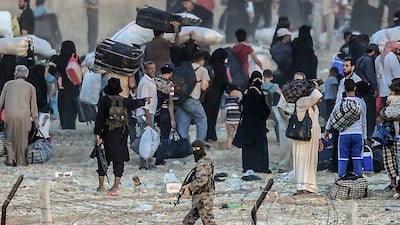AKCAKALE, Turkey // Syrian Kurdish fighters closed in on a strategic ISIL-held town on the Turkish border on Sunday, potentially cutting off a key supply line for the extremists’ de facto capital.
“The clashes are ongoing now on the eastern edges of Tal Abyad, 50 metres from the town. We are fighting for control of the first checkpoint,” said Hussein Khojer, a commander with the Kurdish People’s Protection Units (YPG).
Taking Tal Abyad, about 80 kilometres north of the ISIL stronghold of Raqqa, would deprive the group of a direct route to bring in new foreign militants or supplies.
The Kurdish advance, under the cover of intense US-led coalition airstrikes, would also link their two fronts and put even more pressure on Raqqa.
“This advance comes after three days of very fierce fighting in the area,” Mr Khojer said.
He said several Syrian rebel factions were fighting alongside the YPG.
Kurdish fighters seized the town of Suluk and villages near Tal Abyad on Sunday. ISIL fighters had blown up two bridges leading to Tal Abyad to try and stop the Kurdish advance, Mr Khojer said.
“It’s only a matter of time before this area is liberated,” said Idriss Naasan, a Kurdish official. The Kurds surround Tal Abyad from the east, west and south, he said, while the Turkish border, guarded by soldiers, hems the extremists in from the north.
However, ISIL fighters still controlled the road linking the Turkish border with Raqqa, the Syrian Observatory for Human Rights said.
Even if the Kurds cut off Tal Abyad from Raqqa, ISIL could bring in fighters across the border in Syria’s Aleppo province, where they still hold ground. However, that would be an indirect route that could expose them to other fighting amid the long Syrian civil war against president Bashar Al Assad.
The fighting around Tal Abyad has forced thousands of people in the area to flee their homes. Turkey on Sunday began allowing them in after saying for several days that it would only do so in the event of a humanitarian tragedy.
Dozens of Syrians, many carrying sacks of possessions, started passing through the Akcakale border gate as thousands more awaited their turn. ISIL fighters had earlier tried to turn them back from the border but they soon returned.
Nasser Haj Mansour, a Syrian Kurdish defence official, said the YPG was coordinating with the US-led coalition and that the aerial coverage had prevented ISIL from bringing reinforcements to the area.
Brett McGurk, the US deputy special presidential envoy for the global coalition to counter ISIL, told NBC's Meet the Press programme on Sunday that Kurdish fighters and other units in Syria were scoring major territorial gains against the exremists. Mr McGurk said the Kurdish fighters were "really giving a beating" to ISIL.
Since the beginning of May, the YPG has taken more than 200 small Kurdish and Christian towns in north-eastern Syria, as well as strategic mountains seized earlier by ISIL.
They have pushed into Raqqa province, a stronghold of the group. Along the way, they have picked up ammunition, weapons and vehicles left behind by the exremists, almost mirroring the way ISIL overran Iraqi positions last year in their sweep across a third of that country.
With Syria now split mostly between extremist militants and forces loyal to Mr Al Assad, the US has found a reliable partner in the YPG. They are moderate, mostly secular fighters, driven by revolutionary fervour and a desire to eventually have a nation of their own carved out in the region.
The Kurdish gains have alarmed Turkish president Recep Tayyip Erdogan, who said on Sunday that Kurdish groups were taking over areas evacuated by Arabs and Turkmen, which might eventually threaten Turkey’s borders.
Turkey is worried about the risk of separatist sentiment among its own Kurdish minority in the south-west.
Meanwhile, dozens of civilians were wounded when two bombs exploded on Sunday in the central Syrian city of Homs, which lies on a crucial supply route between the capital Damascus and the Mediterranean coast.
Officials said at least 27 people were wounded when a car bomb was detonated in a busy commercial street in the central Karm Al Loz neighbourhood. Footage of mangled cars and destroyed shops and homes were broadcast on state media.
Another bomb later exploded on the southern edge of the city, wounding 10 civilians, according to the state news agency Sana. No one claimed responsibility for the twin bombings.
Residents said the two districts targeted were inhabited mainly by Mr Al Assad’s Alawite minority sect in the city of around one million inhabitants.
The city of Homs lies near the intersection of Syria’s main north-south and east-west arteries, and is on a crucial supply route between the capital Damascus and the Mediterranean coast.
The city was a centre of the insurrection against Mr Al Assad’s rule and was an major opposition stronghold until it was retaken by the army in May last year. Only one neighbourhood remains under opposition control.
Homs lies 150km to the west of Palmyra, also known as Tadmur, which ISIL seized last month.
The Syrian army and militia fighting alongside it have lost swathes of territory to insurgent groups recently, including the north-western province of Idlib which fell to an alliance of hardline militants, including Al Qaeda’s Syria’s offshoot, the Nusra Front. They have also lost ground to rebels in southern Syria.
After the loss of Palymra, a symbolic and militarily strategic city in Homs province, and nearly all of Idlib province, the Assad regime appears to be focusing on maintaining control of a western region that includes the capital Damascus, Homs, and the coast, his ancestral home.
* Associated Press, Agence France-Presse and Reuters

